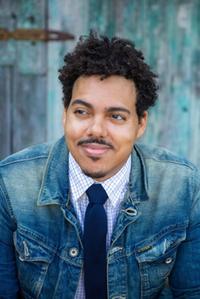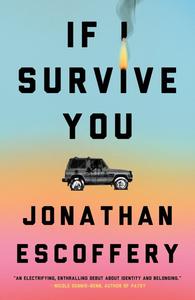
|
|
| photo: Cola Greenhill-Casados | |
Jonathan Escoffery is the recipient of the 2020 Plimpton Prize for Fiction, the 2020 ASME Award for Fiction and a 2020 National Endowment for the Arts Literature fellowship. His writing has appeared in Oprah Daily, the Paris Review, American Short Fiction, Electric Literature and Zyzzyva, and has been anthologized in The Best American Magazine Writing 2020 and elsewhere. Escoffery is a Stegner Fellow at Stanford University and resides in Oakland, Calif. If I Survive You (MCD/Farrar, Straus & Giroux, September 6, 2022) is his debut story collection and follows a Jamaican family striving for more in Miami.
Handsell readers your book in 25 words or less:
Our hyper-observant Jamaican American hero, Trelawny, stumbles into homelessness, pseudo-sex work and the impermeable boundaries of Blackness in his tragi-comedic quest to be loved.
On your nightstand now:
I've mostly been reading debuts this year--up next is Cleyvis Natera's novel Neruda in the Park, Nishant Batsha's Mother Ocean Father Nation and Putsata Reang's Ma and Me.
Favorite book when you were a child:
It might have been Goblins in the Castle by Bruce Coville because I loved the idea of being orphaned (sorry, Mom and Dad) in a castle and setting off toward adventure through a hidden passageway I discover in my bedroom. Retrospectively, I like that it provides witty criticism of both xenophobia and our prison system.
Your top five authors:
Impossible, but let's say:
Zora Neale Hurston for capturing the inner workings of Black humor.
Nella Larsen for her unflinching portrayal of Black identities and their treatment across various geographical locations.
Langston Hughes for everything he ever wrote, starting with "The Negro Artist and the Racial Mountain," which shifted my worldview and my approach to writing fiction.
Kurt Vonnegut for bridging humor and inventiveness by engaging with humanity's many shortcomings.
Denis Johnson for some of the cleanest, most surprising prose ever.
Book you've faked reading:
I've faked so many books. It's usually by accident. I'll be at a cocktail party--a red Solo cup affair, more likely--and I'll be too tall to hear what anyone is saying. Tall people have a terrible time at these things--the chatter is always chest or navel level. And I'll think you mentioned this book when you really said that book with a similar title and by the time I recognize my misstep it's too late to restart the conversation because maybe we connected over our mutual love of that book I now realize I know nothing about and suddenly it's six months later and we're in a relationship and I still haven't read it because what if you have terrible taste?
I also faked Nathaniel Hawthorne's The Scarlet Letter in college. The prose was painful, and I figured I gleaned enough from the title to write a paper on it.
 Book you're an evangelist for:
Book you're an evangelist for:
Johann Hari's Stolen Focus. I proselytized about this book for a solid three months after listening to the audiobook. I lost friends.
It's about all the entities conspiring to not only steal our focus but ruin our individual and collective ability to think. These entities include predatory algorithms deployed by social media companies and the makers of smart devices and mid-20th-century changes to the way we eat and the way we educate our children.
Book you've bought for the cover:
My books are the only art I own, so I'm especially moved by beautiful book covers. Maurice Carlos Ruffin's We Cast a Shadow has a perfect cover (particularly the silver U.S. hardcover), as does Paul Beatty's The Sellout (one of my favorite novels all around), as does Alan Heathcock's new novel, 40. I couldn't leave Marcus Books the other day without Popisho by Leone Ross because of its gorgeous cover.
Book you hid from your parents:
I never hid books from my parents, but had I been asked about what I was reading, I might have omitted all the sex, violence and sexual violence in Brian Stableford's vampire epic, The Empire of Fear, which I read when I was 12.
Book that changed your life:
The Norton Anthology of African American Literature, edited by Henry Louis Gates Jr. and Nellie Y. McKay. My God, the genius in this book! Reading it opened my eyes to the long-running conversation Black writers in America have been holding about the state of Black America and the African diaspora.
Favorite line from a book:
The only line from literature that I can remember off the top of my head that hasn't transcended to cliché is from Vladimir Nabokov's Lolita. "You can always count on a murderer for a fancy prose style." Mostly I remember people in my MFA repeating it over and over, but I like the idea that a writer's "prose style" can tell you about their values, morals, proclivities and so on.
Five books you'll never part with:
Justin Torres's We the Animals because it's probably the most beautiful, musical prose I've ever read.
Denis Johnson's Jesus' Son because on top of the gorgeous prose, Fuckhead is one of the most enjoyable characters ever created because his drug-induced worldview is so tender and cruel and funny as all hell.
Nella Larsen's Quicksand because I hate that I live in a world where this novel continues to be overlooked and undervalued. I suspect that it tells too much truth about the experience of mixed Black American womanhood to ever get its shine.
Writers may be familiar with this adage: books aren't finished, they're abandoned (by their creators). I believe this is true, except in the case of Gabriel García Márquez's One Hundred Years of Solitude. That novel was cooked to perfection.
Finally, for their humor, creativity and empathetic renderings, I'd say Vonnegut's Cat's Cradle or Slaughterhouse-Five, but I keep lending these novels out and I never get them back. If you're reading this, I want my books back.
Book you most want to read again for the first time:
Percival Everett's I Am Not Sidney Poitier is the most outrageously hilarious book I've ever read. I'd love to embarrass myself laughing my head off in public like I did the first time around.

